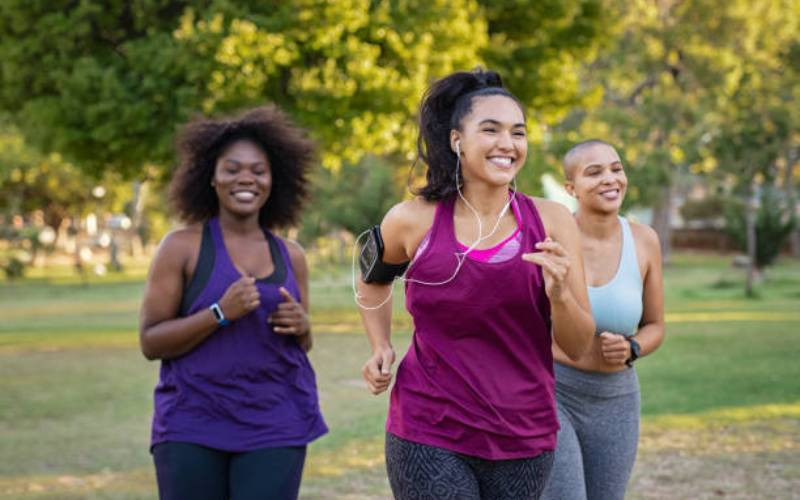Breaking silence: Women's health rights crusaders changing trauma into triumph
Health & Science
By
Rodgers Otiso
| Sep 23, 2024

According to recent data from the Kenya Institute for Public Policy Research and Analysis (KIPPRA), approximately 34 per cent of women in Kenya have experienced physical violence since the age of 15, with 13 per cent reporting sexual violence. These grim statistics underscore the urgent need for awareness and action to address the mental and physical health impact of such traumatic experiences.
Hence, under the sun-drenched plains of Kenya, three extraordinary souls, bound by their unwavering resolve to dismantle the barriers suffocating women's health, converge to make a difference.
Meet Deborah Monari, 25, Josephine Mwende, 34, and Harriet Afandi, 28, from Nguvu Collective. This is a social impact and international development organisation that supports emerging leaders from marginalised communities to create deep social impacts.
The organisation began in Asia in 2017 and spread its roots to Kenya three years later.
READ MORE
How Kenyan banks are losing billions to fraud
Why US ballooning public debt is a key concern for Kenya
Nairobi Expressway contractor to shoulder Sh6.9b tax bill
KEBS on the spot over plans to engage firm to validate vehicle importation papers
Call for business leaders to adopt AI for increased productivity
Tata Chemicals to pause Kenya operations for major upgrade
Mombasa port maintains grip as key hub for Uganda
Safaricom Hook holds training forums for youth in Western Kenya
Deborah, a nurse, is a resident of Nairobi and a survivor of medical malpractice. She's on a mission to stop this horror by pushing for the establishment of patient rights committees in all healthcare institutions.
"I was motivated to start this petition because, being a nurse, I noticed that most hospitals do not have means of resolving patients' complaints but are not regulated by the government," she says, adding, "It is a hospital that decides to have a customer care desk, online forms, and toll-free reporting just to mention but a few. They are not regulated hence holding some bias. There was also a need to silence negligence and malpractice in facilities because statistics are worrying."
She also admits that her calling to the nursing profession, though realised, came as an anticlimax from her experience.
"I became a nurse because I like taking care of people, and wanted to serve my community. But I never thought I would be on the receiving end of medical negligence by the very system that I trusted," she admits.
"In 2022, I was betrayed by the doctors and medical professionals who dismissed my symptoms as panic attacks and other unrelated conditions," Deborah says.
"I was consulting neurologists and I visited around 8 facilities in Nairobi receiving unsatisfactory results. In one of the hospitals, a medic who was attending to me didn't even take two minutes to listen to my issue before he finally prescribed drugs and told me I was to recover or not. I was not satisfied with that recommendation so I went back and checked, and asked what he meant by that. He refused to elaborate further and seemed to be irritated saying, "Why can't you understand what I have told you? I'm the professional here! This was the height negligence," she narrates.
"I recall vividly that, as a result of this, I underwent six months of financial and emotional strain. It was only after I went to India in desperation that I was informed by doctors there that I had a life-threatening brain tumour and I needed surgery," she reveals.
"I am not alone in this suffering. This is, unfortunately, the story of millions of Kenyans who face a failing healthcare system. Many of us may remember the 2017 case of a woman who was forced to give birth on a hospital floor after being turned away from several facilities," Deborah adds.
She is armed with a petition, calling on the government to set up Patients' Rights Committees in health facilities.
"The County Governments to establish Patient Rights Committees in the health institutions in their respective counties," she emphatically adds.
"When we unite and raise our voices, we will have a greater chance of being heard. When the Health Secretary and respective governors take action, we will have done our bit to prevent further suffering, save lives, and ensure access to safe and reliable healthcare for all citizens."
Meanwhile, Josephine, a mother of one, advocates for a hotline in public hospitals for persons with disabilities, emphasising the need for accessible and dignified healthcare services, particularly for expectant mothers with disabilities.
She was born with Cerebral Palsy (CP) in 1990. She was motivated to start the petition to make it easy for Persons with Disabilities (PWD) whenever they encountered any form of discrimination.
"It is every woman's great desire to have a child or children of their own and enjoy the exciting journey of motherhood. Despite having CP, I was over the moon when I learned that I was expecting a baby. Finally, God remembered me and answered my prayers," she says.
"Then came the time for delivery. I was met with a rude shock when I got rejected by one hospital to another. I recall very well a female medic telling my mum upon arrival at the hospital, "We don't handle such people. This broke my heart," she says.
"Moving from one hospital to another in labor pains was quite a horrifying experience. Fear, anxiety, and depression started to sink in, a gift from God was becoming a burden, with teary eyes, I looked up at the sky and asked God why this was happening to me," she adds.
"A breakthrough came when Kenyatta National Hospital finally agreed to admit me and helped deliver my baby. Just because I was a CP survivor that's why I was treated inhumanely by medics. Women with CP go through a rough time during labour and child birth. They get rejected, abused and even in some cases have personal decisions of whether they should carry their child to term made on their behalf," she explains.
"There is a general misconception that women with Cerebral Palsy cannot or should not bear children because they risk giving birth to a child with CP or miscarry," she adds.
The pain and humiliation that she suffered drove her to start an initiative for people living with disabilities, and, according to her, her son, Gift, is a cherished gift from God despite the painful circumstances leading to his birth.
She is also pushing a petition targeting the Ministry of Health, The Ombudsman, and Nairobi County governor's office, to direct that public hospitals in the county operationalise a toll-free hotline where people who face discrimination based on their disability can call and report.
Harriet Afandi, is a certified Human Rights Consultant for the United States' Institute of Diplomacy and Human Rights.
She observes that there has been a rise of expectant mothers complaining of increased cases of harassment and abuse by health workers in various hospitals.
"According to our findings, 62 per cent of our population are psychologically humiliated, and emotionally abused - verbally and non-verbally.
Neglect and mistreatment stood at 28 per cent that is misdiagnosis, unnecessary Caeserian Sections, lack of care, and unnecessary medical usage," she says.
"Physical violence stood at 10 per cent, and pressing women into medical interventions they don't want such as kicking, slapping and even hitting them," she adds.
"I come from a house of five girls and all of them have faced or rather are survivors of emotional, psychological, and physical violence and I was there during their lowest time. So this is what motivated me to start this petition. Why should I not advocate for this silent form of Gender Based Violence focusing on healthcare space where it's evident? she poses.
"In early 2023, Kenyans were treated to a gory Facebook video of a woman, Judy Wambui, crying for help at Kiambu Hospital. Judy had been referred from Athi River to come for maternity services in Kiambu Hospital, only to be neglected by healthcare providers. In the same video, a woman who had come to her defense could be heard painfully complaining how she too was neglected at the same hospital and since then, she has not been able to give birth to another child, " Harriet says.
She, too, has a mountain of petitions to various hospitals to account for the professional misadventures committed in their respective facilities.
In the case of Kiambu, her petition calls on Governor Kimani Wamatangi to make public the findings of the investigation on Wambui's case, and update Kenyans on the steps that have been taken to mitigate such incidents.
"OBV ( Obstetric violence) is another form of GBV that is ignored, under-reported, and sometimes not reported. Advocacy for implementation and passing laws that advocate for OBV is crucial. The OBV Bill of Kenya has been tabled in Parliament but is gathering dust in shelves. The government should ensure this bill is passed to ensure women's rights in facilities are upheld," she concludes.

